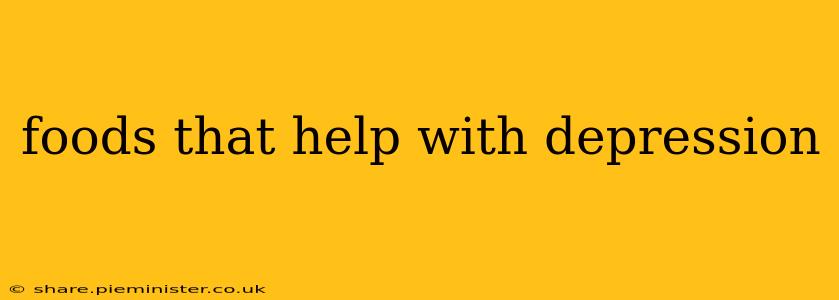Depression, a pervasive mood disorder affecting millions, can significantly impact daily life. While professional help is crucial for managing depression, dietary choices play a surprisingly significant role in mood regulation. This article explores the connection between nutrition and mental well-being, focusing on foods that can support a healthy mood and help manage depressive symptoms. We'll delve into the science behind these food choices and address common questions surrounding nutrition and depression.
What Foods Are Good for Depression?
The best diet for depression isn't a magic bullet, but rather a balanced approach emphasizing whole, unprocessed foods rich in specific nutrients. These nutrients are vital for brain health and the production of neurotransmitters responsible for mood regulation, such as serotonin and dopamine. Focusing on these nutrient-rich categories can significantly improve your overall well-being:
-
Fatty Fish: Salmon, tuna, mackerel, and sardines are packed with omega-3 fatty acids, particularly EPA and DHA. These essential fats are crucial for brain function and have been linked to reduced symptoms of depression and anxiety. Omega-3s help reduce inflammation in the body, which can contribute to mental health issues.
-
Leafy Green Vegetables: Spinach, kale, and collard greens are excellent sources of folate (vitamin B9). Folate plays a vital role in the synthesis of neurotransmitters, including serotonin, impacting mood regulation. Deficiencies in folate have been associated with increased risk of depression.
-
Berries: Blueberries, strawberries, raspberries, and blackberries are rich in antioxidants, particularly anthocyanins. These powerful antioxidants combat oxidative stress and inflammation, which are believed to contribute to depression. The high fiber content also aids digestion and promotes gut health, increasingly linked to mental well-being.
-
Whole Grains: Oats, brown rice, quinoa, and whole-wheat bread provide complex carbohydrates that release glucose slowly into the bloodstream. This gradual release provides sustained energy and helps stabilize blood sugar levels, preventing mood swings and energy crashes often associated with depression. They're also a good source of B vitamins.
-
Nuts and Seeds: Almonds, walnuts, flax seeds, and chia seeds are excellent sources of healthy fats, fiber, and magnesium. Magnesium plays a crucial role in regulating neurotransmitters and reducing stress. A deficiency in magnesium is linked to increased anxiety and depression.
-
Fermented Foods: Yogurt, kefir, sauerkraut, and kimchi are rich in probiotics, beneficial bacteria that support gut health. The gut-brain axis, the connection between the gut and the brain, is increasingly recognized for its influence on mental health. A healthy gut microbiome may contribute to improved mood and reduced symptoms of depression.
-
Dark Chocolate (in moderation): Dark chocolate (with a high cocoa content) contains flavonoids, which are powerful antioxidants with potential mood-boosting effects. However, it's crucial to consume it in moderation due to its sugar and calorie content.
Does Diet Directly Cause Depression?
While diet alone doesn't cause depression, nutritional deficiencies and an unbalanced diet can significantly exacerbate symptoms and increase the risk of developing the disorder. Many of the nutrients mentioned above are essential for optimal brain function, and deficiencies can negatively impact mood and cognitive function. A healthy diet is a crucial component of overall mental health.
Can Changing My Diet Help With My Depression?
Yes, incorporating the foods listed above into a balanced diet can be a helpful adjunct to professional treatment for depression. A diet rich in these nutrients can support brain health, improve mood regulation, and potentially reduce the severity of depressive symptoms. However, it's crucial to remember that diet is not a replacement for therapy or medication. It's a complementary approach that can significantly enhance treatment effectiveness.
What Should I Avoid Eating If I Have Depression?
While focusing on nutrient-rich foods is crucial, it's equally important to limit or avoid certain foods and substances that can negatively impact mood and worsen depressive symptoms:
-
Processed foods: High in unhealthy fats, sugar, and sodium, these foods contribute to inflammation and blood sugar imbalances, negatively affecting mood.
-
Excessive sugar: Causes energy crashes and mood swings.
-
Excessive caffeine: Can exacerbate anxiety and sleep disturbances, common symptoms of depression.
-
Alcohol: While it might provide temporary relief, alcohol is a depressant and can worsen depressive symptoms in the long run.
What Vitamins Are Good for Depression?
Several B vitamins, particularly folate (B9) and B12, are crucial for neurotransmitter synthesis and overall brain health. Vitamin D also plays a significant role in mood regulation. While supplementing these vitamins can be helpful under a doctor’s guidance, obtaining these nutrients through a balanced diet is always the preferred approach.
Remember: This information is for educational purposes and should not be considered medical advice. If you are experiencing symptoms of depression, it's essential to consult with a healthcare professional for proper diagnosis and treatment. A healthy diet can be a valuable tool in managing depression, but it should be part of a comprehensive approach that includes professional help and self-care strategies.
